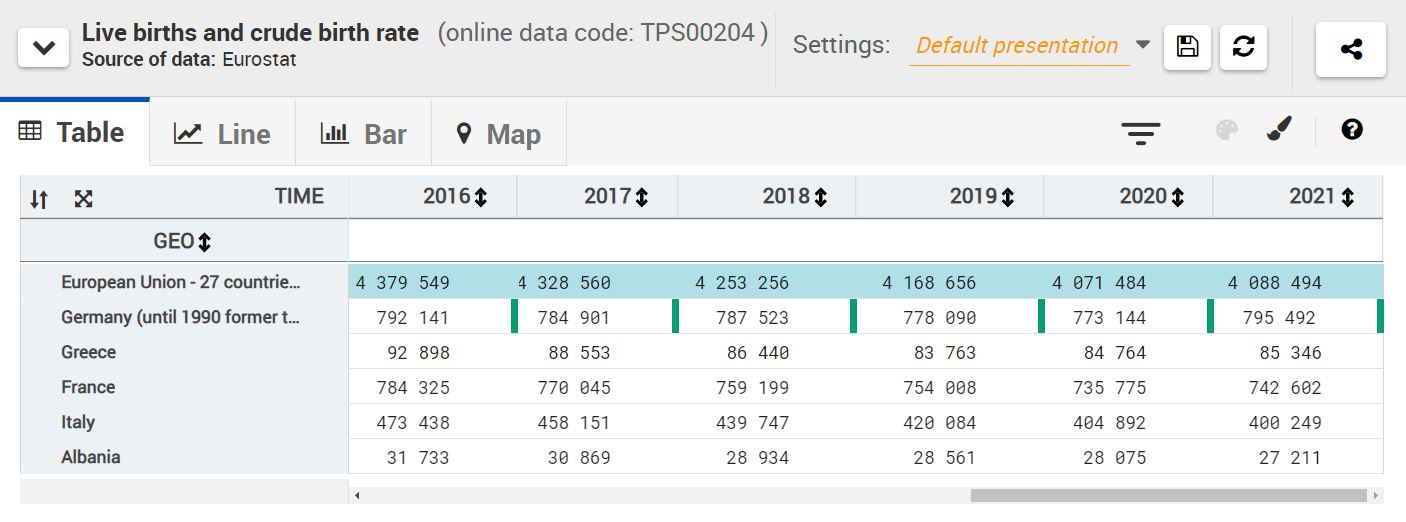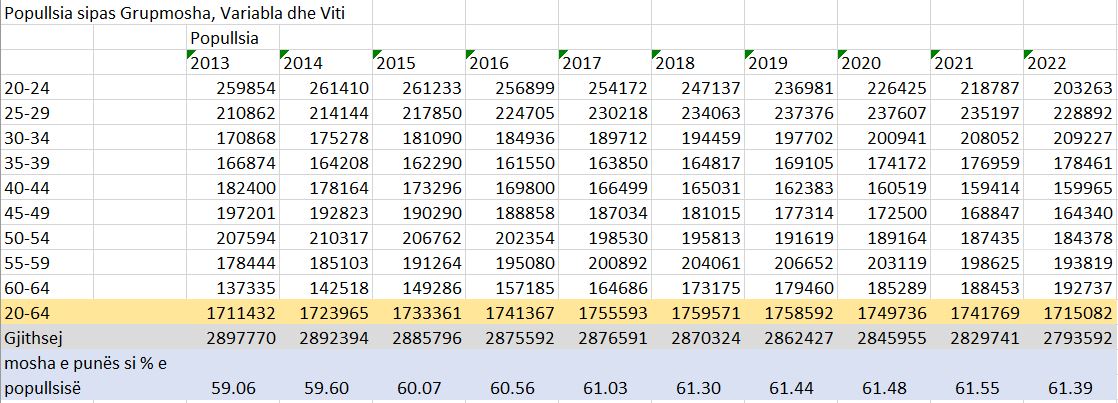“…. Europe has embarked on a war that will become increasingly ruthless every day, reminiscent of the expression “the big fish eats the small one at any cost,” and people will be wolves to each other. States will be wolves to other states because Europe’s demography is in conditions that are leading towards a continental tragedy. – Edi Rama, Parliament, May 25, 2023
With these words, Prime Minister Edi Rama addressed the citizens from the podium, defending his government in the face of the fact of citizens leaving the country.
This is not the first time that Prime Minister Rama calls for war to justify the unpleasant consequences that, according to him, have arisen due to the earthquake in 2019, COVID-19 in 2020, the war in Ukraine in 2021, and now apparently this one that Rama refers to as the “war of Europe.”
The exponential decline in births in the most developed countries of Europe has reached a point today where it is being reflected in the labor market, and where the most developed countries are in a situation where they either have to aggressively seek labor from all possible sources to compensate for the labor shortage, or they have to accept the decline of their success and the beginning of their bankruptcy. Starting from Germany, the locomotive of Europe and the continent’s superpower, which by 2030 will need 7 million workers outside the German demographic system. And when I say workers, I mean workers for all jobs not just one type of job. Prime Minister Rama continued.
Statistical reflections
In fact, the cause-effect relationship that Prime Minister Rama establishes between the decline in birth rates and shortages in the labor market does not align with EUROSTAT’s figures. According to statistical data from Europe, birth rates have declined overall, but not in Germany, which in 2021 recorded a higher annual increase compared to the annual decline in the same year throughout the European Union.

At the same time, the population in Europe has been increasing in the last 10 years. According to INSTAT, in 2021, the European Union had about 5 million more people than in 2013. Germany has also seen growth, with 2.5 million more people from 2013 to 2021. Albania, on the other hand, appears differently, as it has approximately 83,000 fewer citizens today than in 2013. (Search code in EUROSTAT: DEMO_GIND)

The European Union’s demographic report for 2022 measures the impact of population changes on the labor market. According to this report, “ The demographic composition of the labor market in the EU has not changed fundamentally in recent years. However, the EU’s working-age population is shrinking. Over the past decade, the EU’s working-age population fell from 269 million in 2012 to 264 million in 2021.”
The situation in Albania is reflected differently, where according to data from INSTAT, the working-age population relative to the total population has remained almost unchanged over the past 10 years, with a difference of 1.3 percentage points from 2013 to 2023.

As for the number of those who emigrate, in 2023 INSTAT calculated over 46 thousand people who left Albania (11% more than last year) and about 14 thousand who returned (52% more than last year).
Employment law in Germany
The prime minister did not stop with his comparison with Germany. Furthermore, to illustrate Europe’s “battle” to attract employment, the Prime Minister announced the passage of a new law there.
” The law that Germany passed a few weeks ago should be stuck in the heads of all those who deal with politics in Albania. It is a law that opens Germany’s doors to the under-35, unskilled workforce. Never before has a state adopted a law for unskilled workers. ” – said Edi Rama, in Parliament on May 25. Based on this statement, Faktoje turned to the German government to learn more about this legal initiative. Through a request for information, we asked to get to know the legal package referred to by the prime minister, which aims to attract unqualified employees under 35 years of age.
The law, not yet approved in Germany
In the response received from the press office for the Federal Ministry of Labor and Social Affairs in Germany, we were informed that the law in question is still in the proposal stage and has not yet been approved.
The spokesperson of the Federal Ministry of Labor and Social Affairs clarified:
“Note that the draft proposal has not yet been voted in the Parliament and therefore it may change in some details. ”
The answer came on May 25, the same day that Prime Minister Rama announced ” the law that was passed a few weeks ago in Germany “.
Unskilled workers under 35?
The information that the German government gave about the new law on migration in Germany is published on the official website of the Bundestag and is called “Immigration of skilled workers in Germany | The new law 2023“.
According to this information, in 2023 it will be even easier for qualified workers to go to Germany. “At the end of November 2022, the Federal Government decided on key points for the new regulation, which will extend the Skilled Workers Immigration Act that has been in force since March 2020.” – says the article.
“In the race for talent and helping hands, we are offering new and above all easier ways to work in Germany“. – the German Labor Minister, Hubertus Heil, is quoted as saying.
The new draft law in Germany is expected to have three main pillars for labor migration.
- Skilled labor pillars remain the central element of immigration for the Federal Government. The first pillar will continue to be the EU Blue Card for academic specialists. However, existing salary thresholds will be lowered. In addition, the new regulations will make studying or training for work in Germany more attractive.
- The second pillar is that of experience. This pillar will also enable skilled workers to immigrate, even if their professional skills has not been formally recognized in advance. Prerequisites include an employment contract and at least two years of professional experience.
- The other possible pillar is aimed at people who do not yet have an employment contract in Germany. The point is to offer a new opportunity card. With the help of a point system, potential must be determined based on various criteria. Among other qualifications, language skills and professional experience will be considered.
To understand what is considered a qualified or skilled worker, we refer to the Skilled Workers Immigration Act, of which the proposed new law will be a part.

According to this definition, skilled or qualified employees “are not only graduates with university degrees recognized in Germany, but also workers with professional qualifications recognized in Germany“.
Based on these data, it is impossible to understand which part of the law Prime Minister Rama was referring to when he announced that Germany is looking for unqualified workers under 35 years of age.
The need for unskilled workers, not for the first time
Searching the net for these specifics, it turns out that the European Union has a guide for “opening Europe’s doors to unskilled or low-skilled workers”. This guide was dated 15 December 2010 and was intended to create an inventory of admission and residence procedures for unskilled and low-skilled third-country workers entering the labor market of the 27 EU member states.
Based on the conclusions of this guide, since 2010 many countries of the European Union are in need of unskilled or low-skilled labor force.
“In some EU member states, such as Belgium, Denmark, Germany and the Netherlands, there are still bans on the recruitment of third-country nationals. This is often due to the fact that nationals of some EU Member States, who are favored over third-country nationals in the labor markets of other EU Member States, are available for low-skilled jobs and unqualified. ” – the report states. On the other hand, “ Southern countries, including Greece, Italy, Portugal and Spain, recognize the need for unskilled workers from third countries. However, due to the high rate of unemployment among the local population as a result of the global economic crisis, the employment of third-country workers in these countries has been drastically reduced or put on hold,” the report states.
Why does Rama ring the bells of war?
In order to understand the reason why Prime Minister Rama chooses to compare the problem of migration and the labor force as a “battle that is turning the whole of Europe into wolves”, Faktoje consulted Neritan Sejamini, an expert in public policies and very knowledgeable about politics.
“ This statement by Rama is for local consumption and in a way the local audience is the internal audience. On the one hand, he will create the idea that the migration problems of Albanians are not typical Albanian problems, but problems of a wider European or global order, where Western countries, in the absence of qualified labor force, due to the dynamics of internal, are creating very good conditions to receive qualified workers, especially qualified professionals, from other countries.

This type of attraction, according to him, is so great that you cannot blame Albania that doctors, nurses and the engineers are leaving. On the other hand, it will justify the arrival of unqualified workers in Albania, who arouse some dissatisfaction in the country, since in the public opinion, first of all, there is the problem of accepting other cultures, and on the other hand, the problem is that it is thought that they will take the work of Albanians. and that this is how we are uniting the Albanians and replacing them with more foreigners.
Placing Albania simply in the framework of this world problem where Western countries are taking workers from other countries, it will justify the arrival of the workforce, in this case unqualified, mainly from Southeast Asian countries such as Bangladesh, India, Pakistan, etc.
What the prime minister does not say is that Albania’s qualified power is leaving and is being replaced by unqualified power, which is an indication that the Albanian economy is not developed as it needs unskilled labor and does not provide favorable conditions to maintain the wing skilled labor.” – Neritan Sejamini for Faktoje.
Based on these data and information, it can be said that Prime Minister Rama’s statement is untrue.






